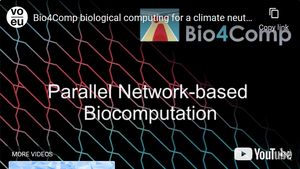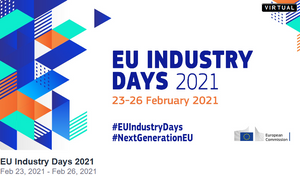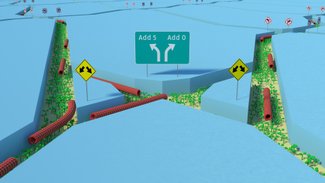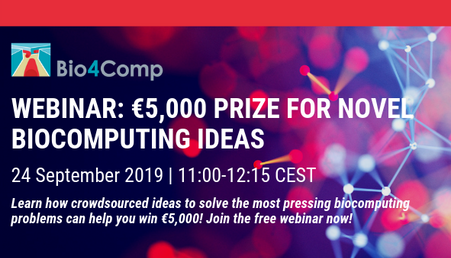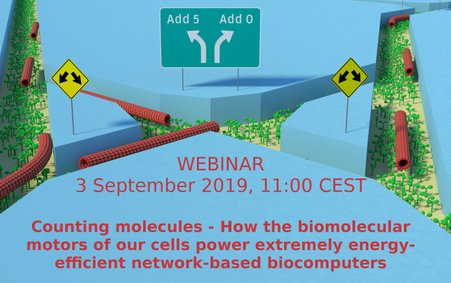Photo: Kennet Ruona
WEBINARS / WORKSHOPS / SEMINARS
Virtual exhibition at the EU Industry Days
23-26 February 2021
Bio4Comp is among the over 40 projects that participate in the virtual exhibition. We demonstrate how this technology can contribute to shaping Europe's digital future. Register and visit our virtual booth; Chat with us or book live meetings; Vote for your us as your favourite project before noon on Friday:
Webinar; Image by Gerd Altmann from Pixabay
Webinar: MOLECULES THAT COUNT
10 December 2020, 12:00 CET
Everyone in the fields of alternate computing, biotechnology and lab-on-a chip devices is invited to discuss with Bio4Comp researchers the challenges and prospects of developing our technology platform into marketable applications and shape the future of our technology.
The EC supports Bio4Comp in organizing this webinar to present our contribution to shaping Europe's digital future. Our
our approach uses orders of magnitude less energy than conventional computers, thus addressing issues related to power-consumption and heat-dissipation. We demonstrate the feasibility and scalability of this approach by fabricating and operating devices that solve several NP-complete problems of increasing difficulty.
BIOCOMPUTATION – AN ALTERNATIVE APPROACH IN COMPUTATION
Calculating using Molecules in Microfluidic Networks
Recently, Bio4Comp researchers held a colloquium about biological computing. Here, you can download some of the presentation slides, translated to English, to give you a summary and an overview.
The Bio4Comp researchers Thomas Blaudeck, Christoph Meinecke, Sönke Steenhusen and Till Korten touched the topics Alternative Computing, Computational Complexity, Principle and Architectural Elements of Network-Based Biocomputation, Scale-Bridging Manufacturing from Nano to Macro and Biocomputers in Action.
The facts that biological computing needs very little energy per computing operation and that the computing is truly parallel result in favourable conditions for upscaling. The researchers present the challenges in systems integration and how they can be tackled in order to achieve optimal performance and thus, open up this exciting novel technology for a wide range of applications.
The E-MRS spring meeting 2020 was cancelled
Symposium: Biocomputation: materials, algorithms, devices and fabrication
at the E-MRS Spring meeting, cancelled
A key advantage of biocomputation is the potential for much-improved energy efficiency compared to both traditional, digital transistor technology and – probably – quantum computation. However, progress in bio- and bio-inspired computation is critically dependent on the development of new materials and fabrication technologies, and requires an interdisciplinary approach engaging materials science, computer science, biophysics, cognitive science, micro- and nanofabrication, sensing, electronics and photonics. By inviting key scientists active in biocomputation in these different areas, the symposium will offer an overview of the latest advances in materials research at an international level and of relevant interdisciplinary research in both fundamental and applied areas.
Are you a researcher in the biocomputing field? Get recognised for your work and learn more about the €5,000 Bio4Comp Open Innovation Award in our webinar on 24 Sept. 2019, 11:00-12:15 CEST.
During the webinar, we unveiled the 2nd Call for Applications, the new topic and the mechanics of the awarding where the new winning idea will win €5,000.
The webinar also announced the winner of the first round who presented their winning idea which addressed “Encoding and decoding of information from cytoskeletal filaments for parallel computing”.
Imagine a high-performance computing cluster that runs on a few kilograms of biochemical fuel instead of megawatts of electrical power. This may sound like science fiction now, but in principle, it is actually possible, thanks to network-based biocomputing.
But how can bio-molecules perform mathematical calculations?
This was the topic of the webinar "Counting molecules - How the biololecular motors of our cells power etremely energy-efficient network-based biocompueters" that was held on 3 September 2019. The speakers were Till Korten and Cordula Reuther from TU Dresden and Roman Lyttleton, Lund University, experts in biophysics and nanotechnology.
Workshop “NEW DIRECTIONS IN BIOCOMPUTATION”
DRESDEN, GERMANY, SEPTEMBER 12-13, 2017
see scope, speaker information and download abstract booklet on the workshop page
Photo: Anja Upmeier

